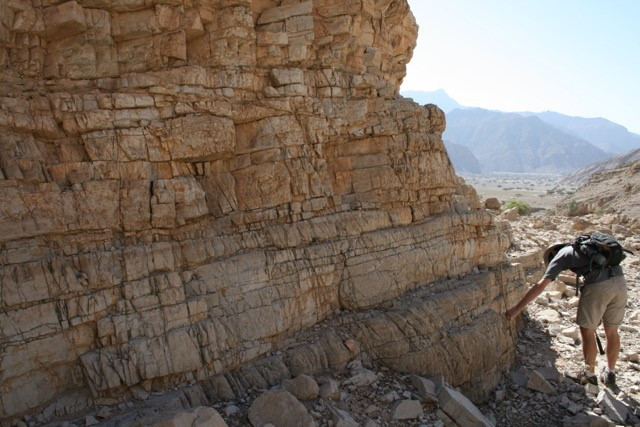The ancient rock formations in Oman reveal why life recovered slowly on Earth
By studying the ancient stone ranges in Oman (a kingdom in the southeast of the Arabian Peninsula), scientists at the University of Edinburgh identified the reason why life on earth was halted to 5. - 10 million years ago began to recover, after the extinction event, 252 million years ago.
In the past 252 million years, the Permian-Triassic extinction event has swept up 96% of marine life and more than 70% of terrestrial vertebrates, making about 83% of the spending on 57% of the animal family. on earth extinct. At this time, life on Earth is almost "frozen" and it takes about 10 million years to begin showing signs of restoring biodiversity.

Ancient rock ranges in Oman.
According to previous studies, scientists believe that after the extinction event, the water in the ocean is scarce of oxygen, while containing additional toxic ingredients, typically sulfur , that have made life almost extinct, there is no chance of recovery for millions of years. However, by rescuing excavated rocks in Oman, belonging to the remains of ancient rocks, which were formed in the ocean at the time of the Permian-Triassic extinction event; Scientists say the culprit is not sulfur but because of the iron-rich seawater.
Specifically, from six sampling locations, from excavated rock ranges once existed in many different deep, low seawater locations. Data show that the ocean at that time was very low in oxygen, did not exist sulfur but was also rich in iron. Because the water is both low in oxygen and rich in iron, it makes life impossible to develop for many millions of years continuously, until natural conditions are less harsh to allow life to gradually recover.

The Permian-Triassic extinction event cleared up to 96% of marine life and 70% of terrestrial life.
The study is published in Nature Communications, a work contributed to UNESCO's geological research program, conducted by scientists at Edinburgh University, Leeds University, Gratz University, Bremen University and Vienna University. .
Scientists say this study plays an important role in determining how the cause of oxygen deficiency in seawater affects the recovery process at that time. Because oxygen is an essential element of life, biodiversity will immediately be restored when more oxygen appears.
Reference: sciencedaily
- Mars once existed drinkable water
- Earth's oldest life has just been discovered in Northern Canada
- For the first time see rock formations
- NASA robots detect precious clues about life on Mars
- Fans are excited to discover the ancient gods on Mars
- Mysterious spider figure on stone during the opening ceremony of mummy mouth
- Life revives strangely in the dinosaur crater
- Life on Earth will be destroyed after 3 billion years
- Discovering evidence of Earth's oldest life
- The Earth-like continent may have existed on Mars
- NASA extends the list of life-like planets
- Conflict over the real life of the Grand Canyon
 Discovered an ancient centipede fossil 99 million years old
Discovered an ancient centipede fossil 99 million years old Discovered bat-like dinosaurs in China
Discovered bat-like dinosaurs in China Discovered a 200-year-old bronze cannon of the coast
Discovered a 200-year-old bronze cannon of the coast Discover 305 million-year-old spider fossils
Discover 305 million-year-old spider fossils